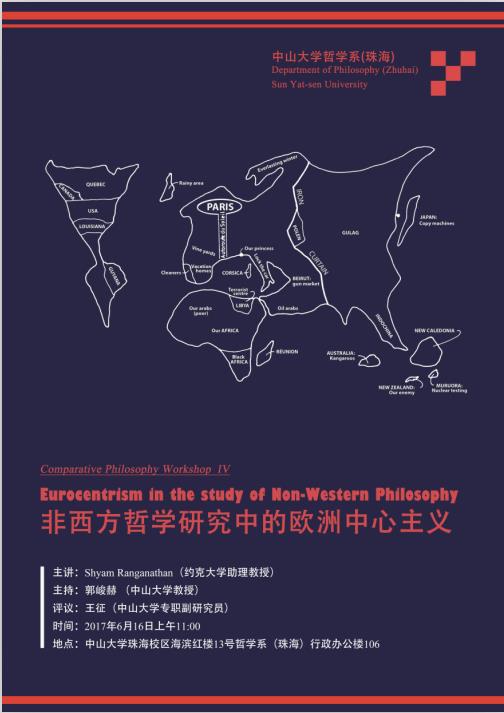Comparative Philosophy Workshop (IV):Eurocentrism in the study of Non-Western Philosophy
非西方哲学研究中的欧洲中心主义

Comparative Philosophy Workshop (IV)
Organizer: Department of Philosophy (Zhuhai),Sun Yat-sen University
Topic: Eurocentrism in the study of Non-Western Philosophy
Speaker: Shyam Ranganathan (Assistant Professor, York University)
Moderator: Jun-Hyeok KWAK, Professor, Department of Philosophy (Zhuhai)
Discussant: Zheng Wang, Research Associate, Department of Philosophy (Zhuhai)
Time: June 16th, 11:00 am
Venue: Room 106, No.13 Administrative Building of Department of Philosophy (Zhuhai), SYSU
Eurocentrism is a basic fact of the study of Non-Western philosophy. One of the dominant expressions of this prioritization of Europe is the marginalization of anything non-European as religion, even when the non-European sources coincidentally defend theories defended by European "nonreligious" intellectuals. Another is the orthodox view in Indology that Indian thinkers did not have a robust tradition of moral theorizing, for anything that deviates from European ethics is not considered ethics by orthodoxy. In this paper, I contrast two differing models of understanding: explication (the explanation of a perspective in terms of its entailed theories that account for its controversial claims) and interpretation (explanation of a perspective in terms of the beliefs or commitments of the interpreter). Interpretation mystifies and religifies anything that is not a derivation from the interpreter's bias, and interpretation with a Eurocentric bias can be shown to be a straightforward derivation from the basic philosophical commitment of the Western tradition, which is traceable to the Greek idea of logos. This is the linguistic account of thought: thought is the meaning of what you say in your language. I argue that this entails interpretation and given its historical origins, keeps Europe as an ultimate interpretive frame as it spreads. It creates religion out of nonwestern philosophy and maintains a historical hostility to philosophy expressed in Europe's history.
These errors can be ameliorated by adopting explication, which has historical roots in meditational philosophies of Asia.
Comparative Philosophy Workshop系列第四讲
主讲:Shyam Ranganathan(约克大学助理教授)
主持:郭峻赫 (中山大学教授)
评议:王征(中山大学专职副研究员)
时间:2017年6月16日上午11:00
地点:中山大学珠海校区海滨红楼13号哲学系(珠海)行政办公楼106
摘要:
在非西方哲学的研究中,欧洲中心主义的盛行是一个基本事实。这种将欧洲置于优先地位的思想的主要表现之一,是使所有非欧洲事物边缘化为宗教信仰,即使非欧洲思想源头所捍卫的理论凑巧与欧洲“无宗教信仰的”知识分子所捍卫的理论一致,这一情况也并未改变。另一个表现反映在印度学的正统观点中,即认为印度的思想家缺乏建立道德理论的浓厚传统,这是由于任何偏离欧洲伦理的思想都不被正统观点视为道德伦理。
本文将比较两种不同的理解模式:解释(从某一思想中引起争议的理论的角度对该思想作出说明)和阐释(从阐释者本人的观点或信念的角度对某一思想做出说明)。解释使得一切非解释者的偏见所衍生出的事物神秘化、宗教化。带有欧洲中心论色彩的解释可以看作是从西方传统的基本哲学立场直接衍生出来的产物。西方传统的基本哲学立场起源于希腊时期逻各斯这一概念。
逻各斯从语言学层面对思想进行阐述:思想是你口头语言所表达的内容。我认为逻各斯涉及到解释这一理解模式,并且,由于其历史渊源,在其传播过程中,欧洲一直是根本的解释框架。其从非西方哲学中创造出宗教信仰并且对欧洲历史上所发表的哲学思想一直持有敌意。这些错误都可以通过阐释的方法得到改正,因为阐释有其亚洲冥想哲学的历史渊源。


